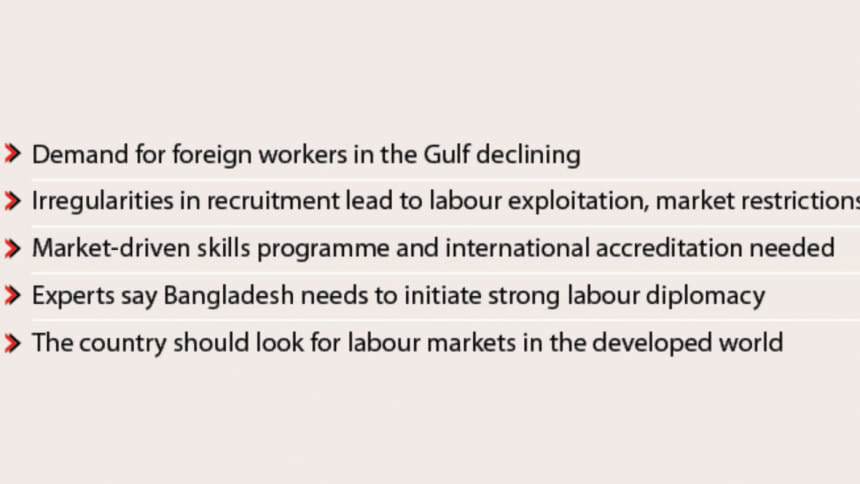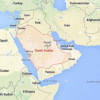Jobs abroad in decline

Bangladesh continues to witness decline in overseas jobs over the last two years amid unabated malpractices in recruitment process, falling demand in the Gulf countries and an absence of effective steps to explore new markets.
More than 10 lakh Bangladeshis secured jobs overseas in 2017 but that came down to 7,34,181 last year, according to the Bureau of Manpower Employment and Training.
In the first eight months this year, the number of jobs Bangladeshis got were 4,17,084. The projected number of jobs by the yearend is 6,25,620.
Labour migration experts and recruiting businesses fear this trend will affect the inflow of remittance, create pressure on local job market and the economy.
An estimated one crore Bangladeshis working abroad sent home around $15 billion last year, which experts say could be much higher if the malpractices in recruitment is checked and migrant rights ensured overseas. Anomalies have also resulted in the restrictions in some markets like Malaysia and the United Arab Emirates.
The job market in the Middle East, the largest one for the Bangladeshis, is also shrinking because of their priorities on creating jobs for their own people in troubled economy.
“We need to clearly analyse these trends and devise strategies how to deal with the situation emerging,” said Prof Syeda Rozana Rashid of international relations department at Dhaka University.
MALAYSIA
Malaysia, the third largest job market for Bangladesh, suspended recruiting Bangladeshis in September last year on allegations that a syndicate of ten recruiting agencies was monopolising the recruitment business and charging recruiting fees as high as Tk 4,00,000 per worker in 2016-18.
The Mahathir-led government has initiated reforms in foreign worker recruitment sector, but is yet to resume recruitment from Bangladesh.
Meanwhile, Nepal, which had stopped sending its workers to Malaysia on allegations that Malaysian companies were involved in anomalies in recruiting workers, recently signed a deal with the Southeast Asia.
“Nepal has successfully negotiated and struck a deal with Malaysia, but we haven’t,” said Prof Rozana, also a migration analyst.
THE UAE
The UAE, the second largest job market for Bangladesh after Saudi Arabia, had imposed restriction for Bangladeshi workers in late 2012.
There was no formal explanation, but officials and businesses said involvement of some Bangladeshis in crimes, and corruption in recruitment led to the restrictions.
Between 2007 and 2012, 16.05 lakh Bangladeshis went to the UAE. Recruiting agents and officials said there were a lot of anomalies in recruitment during that time.
Many of the Bangladeshis did not have jobs in Dubai -- a situation that led to conflicts between brokers and workers and prompted the UAE authorities to close the door.
Presently only individuals of the UAE can hire Bangladeshis in domestic sector -- for jobs of driver, gardener, cook, etc.
Bangladesh and the UAE signed an MoU in April last year and the Gulf country was supposed to recruit Bangladeshis for general workers’ jobs, but it is yet to open it.
“I think it is under process. I am not sure exactly why it’s not beginning,” an official of the UAE embassy in Dhaka told The Daily Star on September 22.
SAUDI ARABIA
Saudi Arabia, which reopened its labour market for Bangladesh in 2015 after seven years of closure, recruited 12.44 lakh Bangladeshis between 2015 and August this year.
However, the country is now strongly enforcing Saudization policy, which means it is preferring recruitment of locals, not foreigners.
Since 2017, some 1.9 million foreigners left Saudi Arabia because of high tax regime on the foreigners and foreign businesses, according to the Saudi media.
Thousands of Bangladeshis are also returning home from Saudi Arabia, some with valid work permits.
An official of Bangladesh consulate in Jeddah said many of the Bangladeshis who came to the Kingdom changed jobs or worked independently in violation of local law.
“However, the Saudi authorities are not allowing such violation of laws anymore. So, some of those who have valid work permits are also being detained and deported,” he told The Daily Star.
According to BMET, 234,071 Bangladeshis went to Saudi Arabia until August this year.
Hanif Mia, a Bangladeshi expatriate living in Riyadh for more than a decade, said many of these workers are actually not getting jobs in the companies that are hiring them. So, they are trying to work independently or in other companies in violation of the law.
“That’s the reason why they are being detained and deported,” he told The Daily Star by phone from Riyadh.
Saudi authorities are also enforcing laws banning operation of certain businesses, including that of mobile phone and electronics, by the foreigners. Many Bangladeshis, who were involved in such businesses are also returning home, he said.
OTHER COUNTRIES
Lebanon, which on an average recruited 16,000 Bangladeshis a year during 2013 and 2016, now recruits around 7,000 workers a year.
Similar is also the case with Bahrain, which has almost stopped recruiting from Bangladesh. Until August this year, Bahrain recruited only 132 workers, which was 811 last year, whereas it used to hire on an average 32,000 a year.
Jordan used to recruit on an average 20,000 workers from Bangladesh every year between 2013 and 2017. Itcame down to around 11,000.
The situation in Oman, Qatar, Singapore remains more or less the same, as they recruited 40,000 to 70,000 workers in recent years.
WHAT TO DO?
The new hope is Japan that has signed an MoU with Bangladesh on recruiting skilled workers.
Language training has begun recently for those who wish to go to Japan. It will take some time to prepare the candidates, BMET officials said.
Migration researcher Syeda Rozana Rashid said major problems that Bangladesh faces are failure in checking high migration cost that gives birth to other labour problems; lack of effective negotiation with the recruiting countries and improving required skills of those migrating.
Nursing, medical technology and caregiving are some of the skills that are required in the developed countries. There isn’t any effective measure in place to prepare the candidates and explore the markets, she said.
Businesses said in many of the cases, workers having skills in one sector are hired for other jobs. Thus, skills are not utilised properly.
Abdul Alim, proprietor of recruiting agency SA Trading, said international accreditation of the skills is very important for those willing to work in developed countries.
“I have tried to say this to the government in different times over the years, but nobody cares.”
Dependency only on the traditional labour markets requiring low and semi-skilled workers will not be helpful in the future, he added.
“If we can make our youths skilled in the professions demanded outside, we can gain much more. It’s high time we plan accordingly and start acting.”

 For all latest news, follow The Daily Star's Google News channel.
For all latest news, follow The Daily Star's Google News channel. 








Comments